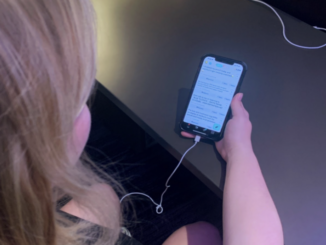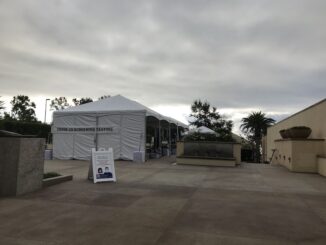
Remote internships have become yet another new norm for college students.
On top of taking classes online, students are completing internships virtually, which involves gaining experience in their desired fields, contributing to organizations and expanding their professional network, all from a computer at home.
Students said they enjoy the flexibility of remote internships but are disappointed by the lack of face-to-face interaction, which they think is a significant part of experiencing the company culture.
“I think the general concerns for me were the quality of the internship, the quality of the work I’d be doing and how much I’d actually be contributing to the company,” said Tamie Daniels, a junior political science and economics double major. “Also, I was nervous about being able to feel like I’m really a part of the company and fostering that team effort.”
In normal times, university administrators did not allow remote internships for academic credit. They made an allowance for them because of COVID-19 through the fall 2020 term.
As students weigh the pros and cons of remote internships, they said frequent communication between internship supervisors and interns makes all the difference.
Despite concerns, many college students said they would consider a remote internship. A majority of these students have the means to and are prepared to do a remote internship from home, according to the Handshake 2020 COVID Report.
New university policy affect on students
To accommodate COVID-19, the university allows students to receive academic credit for remote internships through the fall 2020 term.
There has been no drop off in the number of students enrolled in an internship this fall. There were 113 students in fall 2019 enrolled in an internship course for academic credit, and 112 students in fall 2020, Marla Pontrelli, the director of career education and coaching and the interim executive director of Seaver College Career Center, wrote in an email.
These numbers do not account for the complete number of students doing internships or how many of the internships are remote.
Remote internships have compelled students to be independent, problem-solvers, adaptable and more effective communicators.
“I think it’s a great learning experience for students,” said Amy Johnson, an executive-in-residence in the Business Division. “Most businesses are looking for the ability to be agile and adapt. They want to know if you can keep your resilience and persevere and be productive in a changing environment.”
Even though there are challenges to overcome in a remote environment, most of the students interviewed said they would do another remote internship.
It is unclear whether or not the university will continue to allow remote internships to be eligible for academic credit when the option to be physically present for an internship is possible.
Dana Dudley, assistant dean of Special Academic Programs at Seaver College, said interning in-person provided students many opportunities, such as experiencing the organization’s culture, networking and meeting contacts, and being invited to impromptu company meetings and discussions, Dudley wrote in an email.
“Pre-COVID, very few companies were working in a total remote environment,” Dudley wrote. “If the intern or interns were the only people working remotely, this severely limited the benefits of the internship for the student as well as the student’s learning.”
Johnson said she favors giving students the flexibility to work in the companies, industries and locations they desire but also sees the value in the social interaction that students acquire in their in-person internships.
“I think our students did a really great job this semester,” Johnson said. “It actually gave me a lot of hope that yes, it could work, and they were very resilient and creative and getting their work done.”
Greater flexibility
The flexibility of remote internships proves to be the most favorable aspect for students.
One of the most notable benefits of remote internships is students’ ability to complete an internship from anywhere in the world.
Olivia Benner, a senior international studies and intercultural communication major, interned for Vital Voices Global Partnership in Washington D.C. during the spring semester and transitioned online in March to work from home in Bellingham, Washington.
“An advantage, I think, is the fact that I could do an internship in Washington, DC, while not living there,” Benner said. “I would not have had the opportunity to do that otherwise.”
Many students said they are more productive because with remote internships the emphasis is on the work.
“I’ve been so blessed [to intern] for this company [WorkBoard Inc.] who really values people getting their work done as the priority, not necessarily the hours that are being put in,” Daniels said.
Working from home allows students greater efficiency with their time and incentive to promptly finish their work now that they do not have to remain in an office.
“It was nice that I could work on my projects and finish them on my own time,” Benner said. “And then not feel bad about taking time to do my homework because I had already done everything that I had been given.”
Since they do not have to commute to and from an office, students find that they have more freedom in their schedules to balance their internship work, school and personal life.
“I can be working on an assignment up until the minute that I clock into my internship,” said Emily Harris, a senior international studies major, who is interning for Pepperdine University’s Office of International Programs this year.
Disconnection from the company
Many students thought the biggest challenge of the remote internship experience was the inability to be in a professional setting, interact with coworkers and supervisors and experience the company dynamic.
Students said it was difficult to foster a team environment while remotely interning because everyone worked independently on projects.
“I kind of worked on my own when I was doing it remotely,” Benner said. “Whereas when I was in person, all the interns sat at a huge table, and there were probably about 12 to 15 of us in one room.”
Christian Abad, senior business administration major, interned for Procter & Gamble Co. in summer 2020. Abad said he did not feel connected to the company and his fellow interns because there were no typical in-office opportunities to get lunch or coffee with them or have informal conversations.
“There’s a part of the work environment, which frankly is so much fun,” said Debbie Wideroe, director of the Communication Division’s Internship Program and an advertising professor. “It’s the collegiality, people chatting with each other, going to lunch, taking breaks, and the teamwork that’s organically fostered in the office.”
Senior English major Danielle Aro interned for OneTrack International in summer 2020. Aro said she does not know how the remote internship experience develops her networking or corporate skills.
“I’m just staring at a computer the whole time,” Aro said. “Although a lot of things are done on the internet nowadays, not everything about a job is just what you can do on the computer. So, I do feel like I’m missing out on that part of it.”
Differences in time zones are another factor of remote internships that students felt inhibited their connection with others in the company.
Students found it challenging to navigate communication with coworkers who lived around the world.
Abad lives in Granada Hills, California, and Procter & Gamble is based in Cincinnati, Ohio. He said he would wake up as early as 4 or 5 a.m. to join a 7 or 8 a.m. meeting.
Other students, like Benner and Daniels, said their internship supervisors were very considerate of their interns and employees in different time zones.
Desire for increased communication and meetings
When reflecting on their internship experience, students said they would have improved their ability to connect with other interns and increased communication between supervisors and interns.
“I would [have liked the company to] schedule more concrete meetings, especially if there’s a team involved,” Aro said.
The company Aro interned for used a Facebook group and email chain to communicate with interns. Aro said she would have benefitted from weekly meetings to share what everyone is working on and how the supervisors can assist and encourage others.
Even if it is five to 10 minutes, 67% of college students find it helpful to have daily check-ins with their manager or supervisor throughout their virtual internships, according to Yello survey of over 900 college students in April.
“Some [employers] that I talked with were conscientious of the distance, so they did a good job of trying to check-in with the student one or two times a day, having meetings and scheduling different types of sessions with them,” Johnson said. “And then there were some [employers] that didn’t do that, so it really depends.”

The increased interaction between supervisors and interns significantly impacted students’ internship experience, both professionally and socially.
Benner and Harris said they had to attend weekly meetings in their internships, which they felt helped guide them in their tasks.
Daniels said she had a close bond with her coworkers and appreciated everyone’s support, all the way up to the CEO.
“The company does happy hours and certain gatherings and events where we all come together, and those are super fun,” Daniels said.
Advice for students
Pontrelli recommended that students over-communicate with their supervisors.
“It never hurts to check in and see that you are performing at the expected level with your supervisor, that you’re doing enough and that you’re doing the quality of work that the supervisor has anticipated of you,” Pontrelli said.
Pepperdine faculty and staff encouraged students to take ownership of their experience, reach out and ask for help if needed.
“Show that you can be independent, you can do project-based work and you have digital literacy,” Pontrelli said. “You’re building those skills in order to be resourceful and get the information you need to get the work done.”
Many students recommended dedicating an appropriate amount of time to internship work, school and personal life.
Students said that since they are working from home, it is easy to get consumed because the boundaries between work and home life are blurred.
“I think it’s really important to have different spaces for things,” Aro said. “With the remote internship, I have a desk for school, then I have my bedroom for relaxation only, and I do my internship work at the dining table or go outside and do it so that I don’t spend too much time in one area.”
Kyla Moore completed the reporting for this story in Jour 241 in Fall 2021 under the supervision of Dr. Christina Littlefield and Dr. Theresa de los Santos. Dr. Littlefield supervised the web version of the story.




